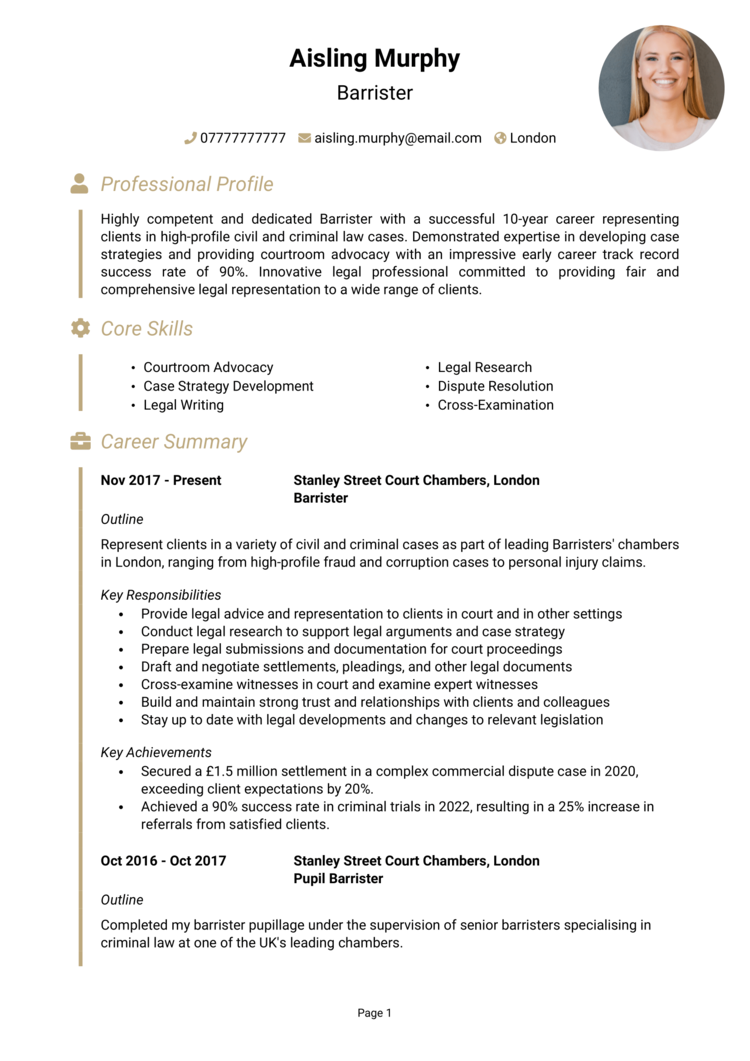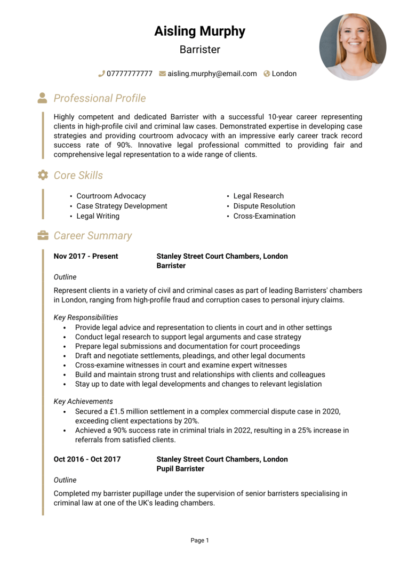You know how to build a compelling case – but now it’s time to advocate for yourself. Whatever role you’re seeking, your CV needs to present your arguments concisely and persuasively.
This guide (with a Barrister CV example) will help you construct a polished, professional CV that highlights your legal expertise and courtroom experience – without any unnecessary jargon or repetition – to help land you the role you deserve.
Barrister CV

How to write your Barrister CV
Discover how to craft a winning Barrister CV that lands interviews with this simple step-by-step guide.
Writing a CV for such a coveted profession can be difficult. As a barrister, precision and structure are second nature – so your CV should follow the same standard. Employers need to quickly see your specialisms and training.
This guide will walk you through how to present your legal experience and academic background in a way that makes your CV stand out – whether you’re at the start of your career or already practising.
Barrister CV format and structure guidelines


A coherent CV structure allows the reader to quickly grasp your expertise and suitability for the role or tenancy. Legal recruiters and clerks don’t want to dig through long paragraphs to find relevant details – so aim for a clean, organised layout that showcases your strengths from the outset, free from any avoidable errors.
Here’s the layout to follow:
- Name and contact details – Add these contact details at the top so you’re easy to reach..
- Profile – A brief paragraph summarising your practice areas, career stage, and professional approach.
- Core skills – List your key abilities in this section, focusing on those that will be most relevant to the job.
- Work experience – Provide a detailed breakdown of your work history, starting with the most recent job first.
- Education & certifications – List your qualifications, including degrees and relevant certifications, in reverse chronological order.
- Additional info – Use this optional space for relevant awards, memberships, or hobbies and interests that enhance your application.
Use bullet points for clarity, divide your CV into clear sections, keep your font professional and readable, and aim for no more than two pages long. Following these simple tips will ensure that your format is nice and readable for busy recruiters, enhancing your odds of landing the role you want.
Creating a strong Barrister profile


Your profile is your opening statement. It should immediately clarify your legal training, career focus, and overall, the value you offer as a barrister. Keep it direct and relevant, with no filler. Recruiters need to see why precisely they should offer you the role, so don’t let them down.
Barrister CV profile examples
Profile 1
Articulate and analytical Barrister with four years of experience in criminal and public law, representing clients in Magistrates’ and Crown Courts. Skilled in legal research, drafting opinions, and advocacy. Experienced in advising on complex legal matters and building strong client relationships. Committed to upholding justice and delivering persuasive, well-structured arguments in court.
Profile 2
Detail-oriented Barrister with five years of experience across civil, commercial, and family law. Adept at preparing legal submissions, negotiating settlements, and presenting cases before judges and tribunals. Strong legal drafting skills and a proven ability to interpret and apply legislation. Known for clarity, precision, and an empathetic approach to client service.
Profile 3
Experienced and strategic Barrister specialising in regulatory and employment law, with six years of experience advising individuals, businesses, and government bodies. Skilled in case analysis, tribunal advocacy, and cross-examination. Proficient in managing caseloads, liaising with solicitors, and preparing complex legal opinions. Recognised for thorough preparation and impactful courtroom delivery.
Details to put in your Barrister CV profile
Here’s what to include:
- Where you’ve worked – Reference any chambers, legal placements, or pupil supervisor experience.
- Your top qualifications – Highlight your Bar course, LLB, or GDL and any academic honours.
- Essential skills – Include advocacy, legal research, drafting, and case preparation.
- Experience within specific practice areas – Mention your exposure to areas like criminal, family, commercial, or public law.
- Work with clients, counsel, or judiciary – Show experience liaising with legal professionals and court staff.
Show off the core skills recruiters look for


The CV skills section gives a snapshot of your legal strengths. Stick to skills relevant to the bar – both practical and procedural. Tailor it to your chosen area of practice or the role you’re applying for.
Give clerks and recruiters a snapshot of the competencies you bring to court, chambers, or client meetings, focusing on tangible abilities rather than generic soft skills.
Most important skills for a Barrister
- Advocacy and Court Representation – Presenting legal arguments in court on behalf of clients in civil, criminal, or family law cases.
- Legal Research and Case Analysis – Investigating case law, statutes, and precedents to build strong legal arguments.
- Drafting Legal Documents – Preparing pleadings, skeleton arguments, opinions, and other court-related documents.
- Client Consultation and Advice – Meeting with clients to provide clear legal guidance and explain possible outcomes.
- Cross-Examination and Witness Handling – Questioning witnesses effectively to challenge evidence and support case strategy.
- Legal Opinion Writing – Delivering structured and reasoned legal opinions on the merits and risks of a case.
- Ethical and Regulatory Compliance – Adhering to professional standards set by the Bar Standards Board and the Code of Conduct.
- Case Preparation and Strategy – Analysing evidence, identifying legal issues, and developing a coherent case strategy.
- Negotiation and Settlement – Representing clients in mediation or negotiation to resolve disputes out of court when appropriate.
- Continuing Professional Development – Keeping up to date with changes in law and legal practice through ongoing training and education.
Describing your work experience


In legal CVs, relevant experience is key – whether that’s legal research or hands-on case preparation. Use this section to show the depth and variety of your experience, as well as the progression of your legal training.
List your work experience in reverse chronological order. Include chambers, law firms, internships, or legal roles (including paralegal work). For pupillage or early-career roles, also include mini-pupillages and marshalling.
What’s the correct way to structure job history on your CV?

- Outline – State where you worked, your title (pupil, intern, paralegal, etc.), and the nature of the practice.
- Responsibilities – Use action words like “drafted,” “advised,” “represented,” or “researched.”
- Achievements – Highlight practical outcomes such as successful applications, judgments, or advocacy milestones.
Sample jobs for Barristers
Barrister | Linley Chambers
Outline
Represented clients in criminal defence cases for a leading criminal law set, appearing in Magistrates’, Crown, and Youth Courts across London and the South East.
Responsibilities
- Prepared and presented cases involving theft, assault, and public order offences.
- Advised clients on plea options, trial strategy, and sentencing outcomes.
- Drafted legal arguments, mitigation submissions, and bail applications.
- Cross-examined witnesses and negotiated with prosecutors on case resolution.
- Collaborated with instructing solicitors to ensure case readiness and disclosure compliance.
Achievements
- Secured acquittals in over 60% of contested trials during 2022.
- Successfully argued a complex legal point resulting in dismissal of charges at trial.
- Received positive judicial feedback for concise advocacy and courtroom professionalism.
Barrister | Grantham Legal Group
Outline
Handled civil and commercial litigation matters for a mixed practice set, advising clients and representing them in county court hearings and mediations.
Responsibilities
- Drafted pleadings, witness statements, and legal opinions in property, contract, and negligence claims.
- Advised clients on settlement strategies and prospects of success.
- Conducted hearings involving interim applications, small claims, and fast track trials.
- Represented clients at mediation, achieving resolution without trial where possible.
- Provided CPD training and seminars to solicitors on recent case law developments.
Achievements
- Achieved favourable settlement in 85% of cases involving contractual disputes.
- Reduced trial listings by securing pre-trial resolutions in over 30 civil claims.
- Praised for client care and practical, business-focused legal advice.
Barrister | Eastgate Employment Chambers
Outline
Specialised in employment and regulatory law for a dedicated employment set, acting for both claimants and respondents in employment tribunals and advisory matters.
Responsibilities
- Represented clients in unfair dismissal, discrimination, and whistleblowing claims.
- Prepared skeleton arguments, cross-examination plans, and tribunal bundles.
- Advised HR departments on redundancy processes, policy compliance, and grievance procedures.
- Delivered training on workplace equality, misconduct investigations, and tribunal preparation.
- Managed a varied caseload and maintained client contact throughout proceedings.
Achievements
- Won over 70% of final hearings in tribunal matters for employer clients.
- Helped avoid litigation in multiple cases through effective pre-action negotiation.
- Delivered CPD-accredited sessions to corporate clients and legal professionals.
What should your CV’s education section include?


Academic background is essential for any aspiring or practising barrister. Include your degrees (LLB, GDL, BA), your Bar course or equivalent, and your call to the Bar. Use reverse chronological order for the education section, starting with the most recent.
Also include academic distinctions, scholarships, or awards from your Inn of Court or university, as well as mooting or debating prizes. Above all else, keep this section concise and to-the-point, to maintain recruiters’ focus on your valuable experience.
What qualifications do employers look for in a Barrister?
- Bar Vocational Studies (BVS) / Bar Practice Course (BPC) – Essential for practice at the Bar.
- LLB (Bachelor of Laws) or GDL (Graduate Diploma in Law) – Foundation legal training.
- Call to the Bar by an Inn of Court – Required to practise as a barrister.
- Academic Scholarships (e.g. from Inner Temple, Middle Temple, etc.) – Demonstrates merit and competitiveness.
- Degree classification (2:1 or above, ideally from a recognised university) – Important for chambers applications.





